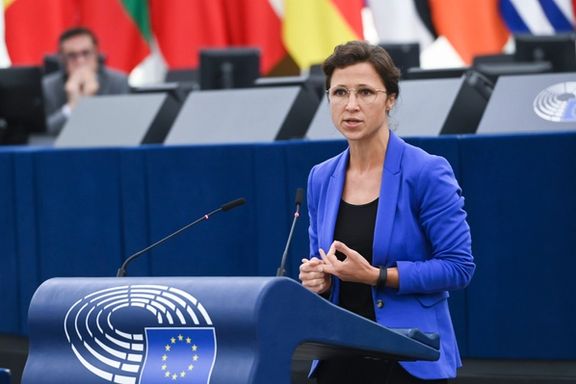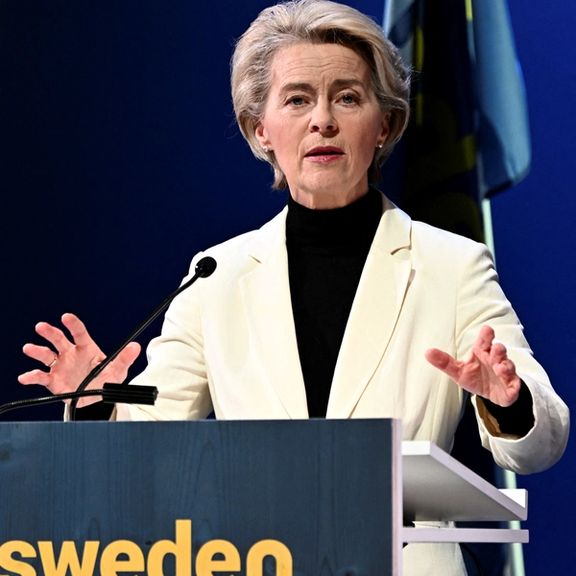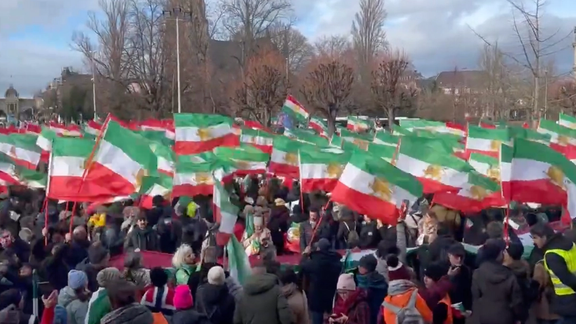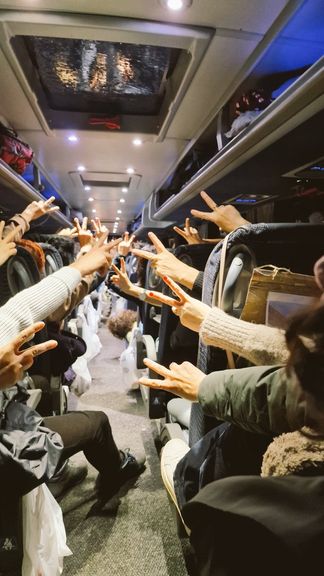Germany Confirms More Sanctions On Iran Guards On EU Agenda

The German foreign ministry confirmed Friday that a plan to sanction more members of Iran’s Revolutionary Guard will be on the agenda at EU foreign ministers meeting on Monday.

The German foreign ministry confirmed Friday that a plan to sanction more members of Iran’s Revolutionary Guard will be on the agenda at EU foreign ministers meeting on Monday.
Two sources told Reuters Thursday that the European Union will add 37 individual entries to its sanctions against Iran on Monday as the bloc is working on listing Tehran's Revolutionary Guards (IRGC) as a terrorist organization.
"We will adopt the fourth package of sanctions against Iran on Monday, and we believe we should already start working on the fifth one to list IRGC as a terrorist organization," said one of the sources, an EU diplomat.
Both sources said 37 new names would be blacklisted for human rights violations when the bloc's foreign ministers meet on Monday. The sanctions would mean the IRGC members would not be allowed to travel to the EU and any assets they hold in Europe would be frozen.
The EU diplomat added, however, that the IRGC would not be sanctioned as an organization - yet.
"If you do this, it has to be legally sound and that is being discussed right now. But it won't be ready for Monday."
The European Parliament Thursday overwhelmingly approved a resolution asking the EU to list the IRGC as a terrorist group.
The EU's chief executive, European Commission President Ursula von der Leyen, earlier this week backed the listing of the IRGC as a terrorist organization in response to what she said was the trampling of fundamental human rights in the Islamic republic.

Speaker of Iran’s parliament, Mohammad Bagher Ghalibaf has criticized the motion passed by the European Parliament to list the IRGC as a terrorist organization.
Ghalibaf speaking on Friday said that “If the European Union makes such a decision and lists the Guards as a terrorist organization, it means that the European Union acts as a supporter of terrorism, because the IRGC is the biggest and most successful” anti-terrorist entity.
Ghalibaf was a senior IRGC officer before officially becoming a politician and close friend of Qassem Soleimani who led Iran's military interventions in regional countries.
Ghalibaf was referring to what Iranian officials often claim was the IRGC’s key role in defeating the Islamic State group in Iran and Syria.
Iran’s Revolutionary Guard intervened in the Syrian civil war to assist the government of Bashar al-Assad against the opposition in 2011, years before ISIS emerged as a threat.
In Iraq, many argue, Iran’s program to create Shiite militia forces predated the emergence of ISIS and played a role in inflaming Sunni resentment in the first place.
Although these militias did fight against ISIS, but the determining factor was the role the United States and an international coalition played by air support, weapons and training to the Iraqi army to defeat the extremist Sunni group.
Ghalibaf accused the West of creating and financing ISIS, which without IRGC’s intervention would have attacked London and Paris, he argued. He did not explain why ISIS would have attacked Europe if the West created it.
He threatened that if the European Parliament’s resolution adopted January 19 becomes a final decision by the EU, the Iranian parliament will retaliate “in kind.”

The European Parliament overwhelmingly passed a resolution Thursday calling on the EU and member states to designate Iran’s Revolutionary Guard as a terrorist group.
The resolution demands Iranian authorities end the crackdown on popular protests that started last September after a 22-year-old woman was killed in hijab police custody.
It also demands that Europe should sanction the Islamic Republic’s Supreme Leader Ali Khamenei and its president Ebrahim Raisi.
The issue of adding the Revolutionary Guard (IRGC) to the list of Europe’s terrorist entities became a rallying point for the Iranian diaspora, which launched online campaigns and held a large protest in Strasbourg on January 16 to lobby the European Parliament for passing the resolution.
MEPs demand that all those responsible for human rights violation should face EU sanctions and the IRGC should be on the EU terrorist list.
The resolution is not binding on the European Council that defines the general political direction and priorities of the European Union andcan make final decisions on sanctions.
The European Parliament’s resolution urgesthe EU to expand its sanctions list to cover all individuals and entities responsible for human rights violations and their family members, including Supreme Leader Ali Khamenei, President Ebrahim Raisi, Prosecutor General Mohammad Jafar Montazeri and all foundations (‘bonyads’) linked to the Islamic Revolutionary Guard Corps (IRCG).
It also calls on the Council and the member states to add the IRGC and its subordinate forces, including the paramilitary Basij militia and the Quds Force, to the EU terrorist list. Any country in which the IRGC deploys military, economic, or informational operations should sever and outlaw ties with this entity.
The IRGC played a major role in suppressing antigovernment protests in the past four months, overseeing several security agencies that have killed over 500 civilians, jailed over 20,000 people and inflicted lasting injuries on hundreds of people.
Reports, however, say that the European Union foreign policy chief Josep Borrell is not in favor of sanctioning the IRGC, concerned that the Islamic Republic will not be forthcoming in nuclear talks with the West.
Negotiations that began in April 2021 to revive the 2015 Iran nuclear deal, known as the JCPOA, came to a deadlock in September. In the meantime, Tehran has supplied kamikaze drones to Russia, which are used in attacks on Ukraine’s civilian infrastructure.
The Islamic Republic and its officials, extremely concerned about IRGC’s designation, have been warning Europe in recent days against “the consequences” of such a decision.
The resolution also calls on Tehran in “strongest terms” to stop the execution of detained protesters. So far, the government has hanged four young men after sham trials. It also urges “the authorities of the Islamic Republic to ensure the immediate and unconditional release of all protesters sentenced to death and condemn the fact that criminal proceedings and the death penalty have been weaponized by the regime to stamp out dissent and to punish people for exercising their basic rights.”
The European Parliament also condemned Iran’s military assistance to Russia and its “transnational repression carried out by the authorities of the Islamic Republic, which includes espionage and assassinations, against the Iranian diaspora living in the EU. They call on the EU and the member states to protect those affected more robustly against such repression.”

Iran warned the European Union on Thursday against listing the Revolutionary Guard (IRGC) as a terrorist entity, amid a strong push by European politicians.
Foreign Minister Hossein Amir-Abdollahian told the EU's High Representative for Foreign Affairs Josep Borrell that the EU will "shoot itself in the foot" state media said.
"We have repeatedly said the Revolutionary Guards are a formal and sovereign organization whose role is central for guaranteeing Iran's security. Steps taken by the European Parliament to list the organization as terrorist are in a way a shot in the foot of Europe itself," Iran's foreign minister said.
On Wednesday the European Parliament in an overwhelming vote called for the EU to list the Revolutionary Guard as a terrorist organization, blaming it for the repression of domestic protesters and the supply of kamikaze drones to Russia's military, which uses it to attack Ukraine’s civilian infrastructure.
While the regime in Tehran insists that the IRGC is the country’s formal military organization and should be immune from sanctions by other states, the entity engages in widespread unconventional activities, such as domestic repression and foreign interferences in region countries. It maintains a domestic intelligence organization and prisons for dissidents, as well as engages in torture and other human rights violations.
Widespread anti-government demonstrations erupted in Iran in September after the death of Kurdish Iranian woman Mahsa Amini, who had been detained over flouting the strict dress code imposed on women.
The European Parliament condemned the crackdown on protesters by Iran's security forces, led by the powerful Revolutionary Guard Corps, as "brutal".
These security and intelligence forces have killed around 500 civilians during the protests, maimed hundreds of other, jailed thousands and executed for detainees.
Both the resilience of the protest movement and the strong foreign reactions to government brutality have posed the most serious challenge to the clerical regime in Iran since its establishment in 1979.
The US State Department Wednesday refused to comment on specific steps by the EU, but spokesperson Ned Price told reporters, “What – where we do see eye to eye with our European partners is a recognition that Iran is the world’s leading sponsor of terrorism. There is no more nefarious exporter of international terrorism than Iran. There is no disagreement between the United States and our European allies on this.”
"It is necessary to respect mutual security in the world of diplomacy and increase mutual trust instead of following the language of threats and unfriendly actions. In any case of a terrorist listing, Iran will take reciprocal measures," Amir-Abdollahian said.
The foreign minister’s remarks contradict the behavior of Islamic Republic officials who for decades have threatened the West, Israel and some Arab regional countries.
Iran and world powers, including EU members France and Germany, have engaged in negotiations since 2021 to revive a 2015 nuclear deal, with discussions in a stalemate since September.

European Commission President Ursula von der Leyen said Tuesday she backed listing Iran's Revolutionary Guards (IRGC) as a terrorist organization.
She emphasized that the step would be a necessary response to the "trampling" of "fundamental human rights" in the country.
Iranians living in Europe held a large rally on Monday in Strasbourg outside the European Parliament to demand the listing of the IRGC as a terrorist group.
Many politicians in the European Union have voiced support to proscribe the IRGC. The British House of Commons last week voted to urge the government to designate the group as terrorist.
Ties between the EU member states and Tehran have deteriorated in recent months as efforts to revive nuclear talks have stalled. Tehran has detained several European nationals and the bloc has become increasingly critical of a continuing violent crackdown on protesters, including executions.
"The reaction of Iran regime is atrocious and horrible, and they are trampling over fundamental human rights," she told reporters on the sidelines of the World Economic Forum in the Swiss ski resort of Davos.
The European Union is discussing a fourth round of sanctions against Tehran over the crackdown and Iran's supply of weapons to Russia. Diplomatic sources have said members of the Islamic Revolutionary Guard Corps (IRGC) will be added to the sanctions list next week.
The IRGC leads most government forces in Iran that have used deadly violence against protesters. More than 500 civilians have been killed in four month of unrest by security forces using beatings, shotguns and even military weapons.

Iranians from across Europe gathered in Strasbourg in northeastern France to urge the European Union to list the Revolutionary Guard (IRGC) as a terrorist organization.
Social media videos show numerous groups of Iranians from different countries who traveled to the headquarters of the European Parliament in the city that has a plenary session to debate the listing of the iRGC in a call already supported by at least 100 members of the body. The Parliament is composed of over 700 members.
Busloads of people from the Netherlands, Switzerland, Sweden and Denmark as well as several buses form the German cities of Hamburg, Frankfurt and Berlin departed early in the morning to arrive in time for the demonstration, chanting slogans against the IRGC along the way.

An underground alliance of protester groups in Iran also welcomed and supported diaspora’s initiative. They have prepared posters and flyers to be distributed among the participants. “We wish to declare our full support for listing [the IRGC] as a terrorist organization by the international community,” United Youth of Iran, an underground alliance of revolutionary youth groups from various Iranian cities, said in a statement sent to Iran International. The group has criticized the IRGC’s suppression of protests in Iran, direct and indirect violation of human rights in other countries including Syria and Ukraine, and economic corruption including alleged involvement in drug and arms trafficking and money-laundering by the Guards. “The IRGC’s actions bring nothing but pain, death and corruption to the Middle East and the world,” the statement added.
Expressing support for the rally in Strasbourg, the Association of Families of Flight PS752 Victims, which was shot down by the IRGC with two surface-to-air missiles as it was taking off from Tehran on January 8, 2020, said it has routinely demanded listing the IRGC in its entirety as a terrorist entity. Emphasizing that “the acts of terrorism committed by the IRGC are countless,” the Association said in a statement that “Today, with the people of Iran making their voices heard loud and clear in the Woman, Life, Freedom revolution, it is time that Europe recognize and declare the true terrorist nature of the IRGC.”
In a joint message, prominent opponents of the Islamic Republic have also urged the international community to list Iran's Revolutionary Guard as a terror group. In a tweet published by exiled Prince Reza Pahlavi, football legend Ali Karimi, British-Iranian actress and human rights activist Nazanin Boniadi, journalist and activist Masih Alinejad, and actress Golshifteh Farahani they said, “our request for the international community is clear: put the IRGC on the terrorist list.”
According to some of the participants, time for appeasement of the Islamic Republic has come to an end, and now it is time for action against “the terrorist group” that is the key force to suppress the protesters in Iran and destabilize the region.
During the past few weeks, a hashtag in support of the punitive measure against the IRGC -- #IRGCterrorists -- has been retweeted more than 13 million times by Iranians and foreigners alike. Some social media users have urged Syrians, whose country has been a playground for the IRGC, and Ukrainians whose Russian enemy uses the Iranian-made drones against them, to join the rally and support their cause.
The European Parliament cannot decide to designate the IRGC because the terrorists list is not a list decided by the Parliament itself but by the EU Council, comprised of ministers of each EU country. The members of the parliament are set to vote on a resolution about Iran that would call for the designation of the outfit. The resolution is on the agenda for Thursday and not for the Monday session.
If the resolution garners enough support, it is then upon the national governments of the EU member states to make the final decision. The listing of the IRGC must have a unanimous vote by all 27 EU members in the EU Council.
Members of the UK House of Commons on January 12 unanimously voted for a motion urging the UK government to proscribe the IRGC by listing it as a terrorist organization. Moreover, more than 60 French senators have officially requested that the EU close Iranian banks in Europe and ban the passage of Iran Air planes from European skies, as well as abandon the nuclear agreement known as the Joint Comprehensive Plan of Action (JCPOA) completely.
Unlike the United States which in 2019 under President Donald Trump put the IRGC on its Foreign Terrorist Organizations (FTO) list, European countries avoided the designation in the past few years and prioritized diplomacy with the Islamic Republic in the hope of concluding a nuclear deal.
Many politicians in France, Germany, and other European countries have been keen to pursue the IRGC’s designation by the EU and say that it has been long overdue.
Alireza Akhondi, a Swedish-Iranian member of the Swedish parliament who has been campaigning for the EU designation, said last week that listing the IRGC should be followed by tracing the organization’s money and blocking its money-laundering channels to weaken it. “Let’s rally together, united, and with a common mind to label IRGC as a terrorist organization. Sanctioning criminals is not enough! We need a resolution! Let's make the world a safer place to live in!” he said.
Talks in Vienna to revive the deal, officially known as the JCPOA came to an abrupt stop in March 2022, reportedly for Iran’s insistence that the IRGC be removed from the US FTO list. Later talks elsewhere failed to bring about an agreement.
News that Iran is supplying Russia with kamikaze drones also angered the West and added to the antagonism against Tehran.
So far over 500 protesters have been killed by security forces, mainly consisting of the IRGC and its Basij militia. Four protesters have been executed so far by the state after hasty trials devoid of any regard for due process. Others are on death row.